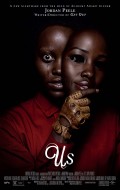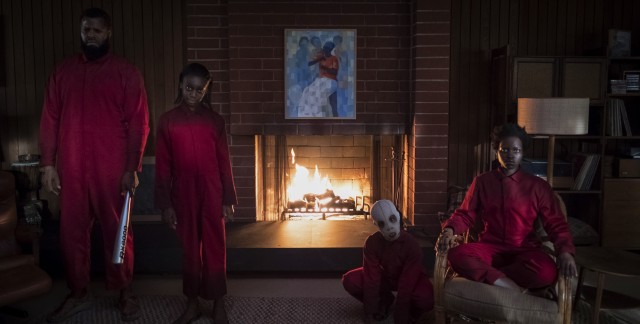Us Movie Review
 |
Us
Theatrical Release: March 22, 2019 / Running Time: 121 Minutes / Rating: R Writer/Director: Jordan Peele Cast: Lupita Nyong'o (Adelaide Wilson/Red), Winston Duke (Gabe Wilson/Abraham), Elisabeth Moss (Kitty Tyler/Dahlia), Tim Heidecker (Josh Tyler/Tex), Shahadi Wright Joseph (Zora Wilson/Umbrae), Evan Alex (Jason Wilson/Pluto), Yahya Abdul-Mateen II (Russell Thomas/Weyland), Anna Diop (Rayne Thomas/Eartha), Cali Sheldon (Becca Tyler/Io), Noelle Sheldon (Lindsey Tyler/Nix), Madison Curry (Young Adelaide Wilson/Young Red), Ashley Mckoy (Teenage Adelaide Wilson/Teenage Red) |
Jordan Peele made about as remarkable a transition as one could going from sketch comedy television to horror cinema on Get Out. The 2017 film received critical acclaim, tremendous commercial success, and ultimately We open in 1986 with a child watching a television that has VHS cassettes like C.H.U.D., The Man with Two Brains, and The Right Stuff nearby. As you should know from probably multiple viewings of Get Out, no detail is insignificant when it comes to Peele's horror. The seemingly innocuous (and, it turns out, authentic) promo for something called Hands Across America will come to have signficance. But first, there is a prologue, set at a carnival at the Santa Cruz beach. There, a young girl named Adelaide enters a fun house of mirrors and discovers something not so much fun as traumatizing.
We will come to discover that the fifteen minutes she spent separated from her parents did much more than just render her silent for a period. In the present day, the girl is in her thirties (Oscar winner Lupito Nyong'o) and now the matriarch of a family of four. Though she has never revealed it to her goofy husband Gabe (Winston Duke, a role one could easily imagine Peele himself playing), she is still haunted by that childhood experience and it is on her mind as the family vacations to the very same beach.
While the beach itself seems to be okay (the fun house is still there, under a new name), when the family gets home, they are troubled by the sight of four people who appear to resemble them just standing together at the end of the driveway of their rented vacation home. As the title suggests, the family is threatened by versions of themselves. But they are somewhat feral versions of them, most of whom only communicate with animalistic howls. The one resembling the mother speaks with the strained whisper of someone fighting through severe laryngitis.
So great is the set-up of Us that once the concept is all laid out, it's disappointing to settle into what is a fairly conventional, albeit heady horror movie. These doppelgangers wear red and carry golden scissors, the image on which the film has been marketed. Who are they? Why are they here? What do they want? These are questions the film takes its time to answer, but in the meantime it's pitting our good-natured protagonists against these unsettling versions of themselves in bloody death battles.
This would be the main event of a lesser horror film and though it constitutes a significant chunk of the two-hour runtime, there is gladly more to Us than just good people trying not to die at the hands of evil beings who look like them. There isn't the timely racial context of Get Out and nor is there anything of similar weight to find here, which means we probably shouldn't expect Peele's second movie to be the Oscar force his previous one was. But that doesn't mean there is a shortage of substance or atmosphere to appreciate, with a strong ending and clever final act twist going a long way to enhance the experience.
Peele has a bigger budget to work with here, which may explain why songs from the Beach Boys and N.W.A. As on his debut, Peele has a disarming amount of craft at his disposal. He again uses to it good effect. He just doesn't have as strong and interesting an idea for us to chew upon here as Get Out. And so we get a well-made, above-average genre effort that doesn't quite have the watershed appeal of Get Out or even last year's horror hit A Quiet Place.
|
Related Reviews:
DVDizzy.com | DVD and Blu-ray Reviews | New and Upcoming DVD & Blu-ray Schedule | Upcoming Cover Art | Search This Site
DVDizzy.com Top Stories:
Written and Directed by Jordan Peele: Get Out | Written by Jordan Peele: Keanu
Now in Theaters: Climax • Captain Marvel • Greta • Triple Frontier
Lupita Nyong'o: Black Panther • Queen of Katwe • The Jungle Book (2016)
Elisabeth Moss: The One I Love • Chuck • Meadowland • High-Rise
Text copyright 2019 DVDizzy.com. Images copyright 2019 Universal Pictures, Perfect World Pictures, and Monkeypaw Productions.
Unauthorized reproduction prohibited.

